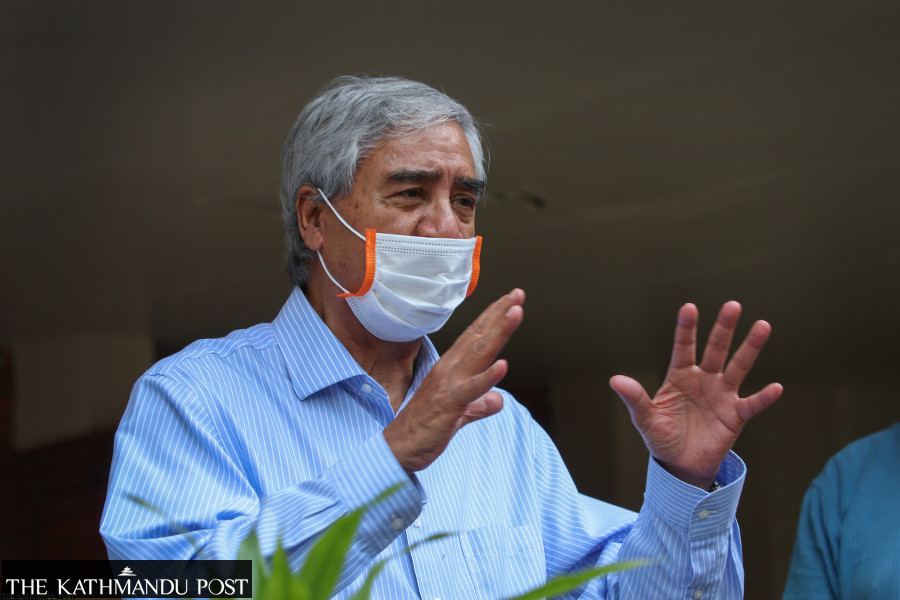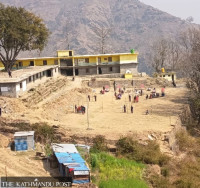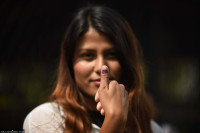National
Prime Minister Deuba's Cabinet expansion woes
Even two months since assuming office, the prime minister has not been able to give a full shape to his government.
Post Report
On Monday, the Sher Bahadur Deuba government completed its two months. Deuba, however, has not been able to expand his Cabinet. Deuba currently is running the government with just four ministers and a minister of state. This is the longest ever period for any Nepal prime minister to have not given full shape to the government since assuming office. Deuba, who holds the record for constituting the largest ever Council of Ministers, with 50 members in 2017, during his fourth tenure, now appears to have set yet another record for running governance with the lowest number of ministers for over two months. Earlier in 1996 also, Deuba had set the record for forming the largest-ever Council of Ministers with 48 members. In 2011, Baburam Bhattatrai’s Council of Ministers had 49 members. In 2015, KP Sharma Oli’s Cabinet had 40 members and Pushpa Kamal Dahal’s had 46 members. To end the trend of forming abnormally large Councils of Ministers, the constitution promulgated in 2015 put a cap on the size of the council. The Council of Ministers now cannot have more than 25 members. Deuba, who in the past faced massive criticism for bloating the Council of Ministers, is currently drawing flak for failing to give full shape to the government.
Here’s everything you need to know about Deuba’s failure to expand his Cabinet.
How did Deuba become prime minister for the fifth time?
Deuba’s Nepali Congress faced an unprecedented drubbing in the 2017 general elections. The alliance of two communist forces—CPN-UML and the Communist Party of Nepal (Maoist Centre)—were voted to power. The parties then merged to form the Nepal Communist Party (NCP). It, however, did not take long for an infighting to start in the party, with co-chairs KP Sharma Oli and Pushpa Kamal Dahal jostling for power. A month after the Supreme Court overturned the Oli government’s first decision to dissolve the House of Representatives, the top court invalidated the Nepal Communist Party (NCP) and revived the UML and the Maoist Centre. In May, Oli dissolved the House again. By this time, Dahal had formed an alliance with Deuba. Some of the UML lawmakers too had extended support to Deuba. Half of the Janata Samajbadi Party too backed Deuba. The coalition went to the court demanding restoration of the House and appointment of Deuba as prime minister, saying President Bhandari played foul in disqualifying Deuba’s claim for the post of prime minister.
On July 12, the Supreme Court restored the House and asked the President to appoint Deuba as new prime minister. Deuba was appointed prime minister on July 13 as per the court order.
Who all are supporting Deuba?
The Maoist Centre, the CPN (Unified Socialist), the Janata Samajbadi Party and the Rastriya Janamorcha are supporting Deuba. The CPN (Unified Socialist) is a new party registered by Madhav Kumar Nepal after splitting from the UML. Nepal’s party has 23 members in Parliament. The Maoist Centre and the Janata Samajbadi have 49 and 19 seats in the lower house while Rastriya Janamorcha has one. All these parties, along with the Nepali Congress, which has 61 seats in the lower house, had voted for Deuba on July 18 when he sought a floor test.
What’s the current composition of the Deuba government?
After his appointment on July 13, Deuba appointed two Congress and as many Maoist Centre leaders to his Cabinet. Bal Krishna Khand and Gyanendra Bahadur Karki from the Congress are home and law ministers, respectively, and Janardan Sharma and Pampha Bhusal from the Maoist Centre are finance and energy minister, respectively. Deuba on July 25 appointed Umesh Shrestha from his party as minister of state for health.
What is hobbling Cabinet expansion?
While there are quite a many aspirants from the Maoist Centre for ministerial berths, the CPN (Unified Socialist) and the Janata Samajbadi Party are the major hurdles. Deuba on August 18 had introduced an ordinance to amend the Political Parties Act, easing provisions for party splits and registration of new parties.
The CPN (Unified Socialist) was formed after splitting the UML, aided by the ordinance. The ordinance also led to a split in the Janata Samajbadi Party, with Mahnatha Thakur registering Loktantrik Samajbadi Party.
The UML on August 17 had expelled as many as 14 of its lawmakers, including Madhav Nepal and sent a notice to the Parliament Secretariat. Speaker Agni Sapkota, however, refused to issue a notice as per the UML’s decision. Accordingly, the Election Commission registered Nepal’s CPN (Unified Socialist). UML chair Oli has filed petitions against the Speaker and the Election Commission, saying the former failed to play a neutral role and that the latter’s decision to register a new party breached the legal provisions. A hearing is scheduled for Monday. The CPN (Unified Socialist) has requested Deuba to wait until the court decision on UML’s petitions.
How have the Political Parties Act’s provisions been changed by the ordinance?
Any group in a party can register a new party if it can prove it has the backing of 20 percent of Central Committee or Parliamentary Party members. The original provision was stricter, as 40 percent of Central Committee and Parliamentary Party members were required for any group to register a new party.
What’s the status of the ordinance to amend the Political Parties Act?
The government on September 8 tabled the ordinance in the lower house. The CPN (Unified Socialist) wants it to be passed by the House as it is–or it wants the ordinance to be in effect until the court responds to the UML’s petitions.
The Janata Samajbadi Party, on the other hand, wants the annulment of the ordinance before it can join the government. As per the existing legal provisions, the ordinance must be endorsed by Parliament within 60 days from the date it was registered in Parliament.
Why is the Janata Samajbadi against the ordinance?
In the Janata Samajbadi also, there are too many aspirants for ministerial berths. It fears a party split if those aspiring for ministerial positions do not get appointments. With 19 members in the lower house and two in the upper house, its Parliamentary Party has 21 members, and as per the amended provisions, just five Janata Samajbadi members can register a party.




 27.41°C Kathmandu
27.41°C Kathmandu













